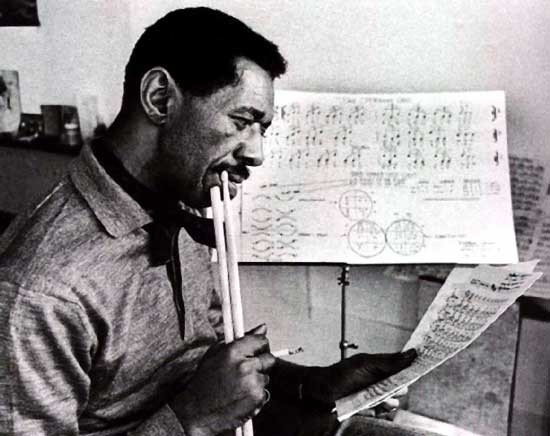I'm at the MLA. It was great meeting Kasey, Nick Lolordo, and Bill Marsh, among others. They had a marathon reading last night with Carla Harryman, Joshua Clover, Jerome Rothenburg, Juliana Spahr, Eileen Myles, and many more. Juliana was sitting in front of me knitting. Next to her was Eileen, who spilled a cup of coffee on the floor at the feet of Brent Cunningham, sitting immediately to my right. Frank O'Hara was in the audience but didn't read. Jorge Luis Borges and Miguel de Cervantes were also in attendance. Heriberto was a no-show. Afterwords we went to Kansas City Barbecue. I talked with Roberto Tejada there.
Email me at jmayhew at ku dot edu
"The very existence of poetry should make us laugh. What is it all about? What is it for?"
--Kenneth Koch
“El subtítulo ‘Modelo para armar’ podría llevar a creer que las
diferentes partes del relato, separadas por blancos, se proponen como piezas permutables.”
29 dic 2003
24 dic 2003
22 dic 2003
It's interesting how they re-impose the heterosexual narrative at the end of The Return of the King. After the tearful homoerotic farewell between Sam and Frodo we see Sam come back to his wife and babies for the final scene in the movie. Did anyone else notice that? It doesn't help matters that Frodo, who is the book is in his 50s, is played by 19-year-old looking actor.
I've suggested that Nick change the name of his blog to "fait accomplissant," the "fact in the act of being accomplished." I think that would fit his style more.
Nick, in an email I got recently, questions the post below, asking me if there is any such thing as "bad prayer." I'm not sure where he's coming from with this. I'd say there could be bad prayer--whether it is evil or simply trivial, or corrupted by ulterior motives. Not being a religious believer, however, I can't really say there's good prayer either.
19 dic 2003
A year ago today I wrote:
Thursday, December 19, 2002
Good and bad poetry. There is so much resistance to thinking along those lines! There is no fixed criterion of excellence, we are told. We shouldn’t call bad poetry bad; it might serve some other valuable function, etc... Yet I feel no hesitation about being the scourge of bad poetry. It seems almost an ethical duty. Why can’t I just leave it alone? Why does it make me suffer so? If I knew that I would understand myself much better than I do. In part it is the feeling that appreciation of dreck comes at the cost of appreciation of what I most value. I see this sentiment in Sorrentino’s masterful attack on John Gardner, so I guess I am in good company. I did learn in the New York Times last Sunday, however, that the unexamined life is worth living after all. Tell it to Dick Detective.
Jordan Davis the other day cited my infamous poem on the “Permission Granters,” a category of poets who inspire me precisely because they are not intimidating “great” poets, the type who make you want to give it all up. I had Ron Padgett in mind. I feel, in my heart, that I am roughly as talented as Ron Padgett. That is not an insult to Ron, whose work I hold in the greatest esteem. I just don’t feel intimidated by him. His work gives me permission (persimmon?) to be a poet. That is, in fact, its specific genius. Can anyone be a poet then? Well, that’s the other side of the good/bad argument. “Permission granted, but not to do anything you want,” as John Cage put it. It’s not a license to promote bad poetry. Think of the poem "Poetic License." "This license certifies / that Ron Padgett may tell whatever lies / His heart desires / Until it expires."
Thursday, December 19, 2002
Good and bad poetry. There is so much resistance to thinking along those lines! There is no fixed criterion of excellence, we are told. We shouldn’t call bad poetry bad; it might serve some other valuable function, etc... Yet I feel no hesitation about being the scourge of bad poetry. It seems almost an ethical duty. Why can’t I just leave it alone? Why does it make me suffer so? If I knew that I would understand myself much better than I do. In part it is the feeling that appreciation of dreck comes at the cost of appreciation of what I most value. I see this sentiment in Sorrentino’s masterful attack on John Gardner, so I guess I am in good company. I did learn in the New York Times last Sunday, however, that the unexamined life is worth living after all. Tell it to Dick Detective.
Jordan Davis the other day cited my infamous poem on the “Permission Granters,” a category of poets who inspire me precisely because they are not intimidating “great” poets, the type who make you want to give it all up. I had Ron Padgett in mind. I feel, in my heart, that I am roughly as talented as Ron Padgett. That is not an insult to Ron, whose work I hold in the greatest esteem. I just don’t feel intimidated by him. His work gives me permission (persimmon?) to be a poet. That is, in fact, its specific genius. Can anyone be a poet then? Well, that’s the other side of the good/bad argument. “Permission granted, but not to do anything you want,” as John Cage put it. It’s not a license to promote bad poetry. Think of the poem "Poetic License." "This license certifies / that Ron Padgett may tell whatever lies / His heart desires / Until it expires."
The kind of people on the poetics list (hypothetically speaking of course) who complain about how much power Ron Silliman has, how blogs don't allow for democratic response--what have you. They are probably the same people who read only Silliman's blog (which gets approximately twice the web-traffic of the typical poetry/poetics blog). Hence, they are the ones responsible for putting Silliman's blog in its exalted position in the first place. They give him his power, only to complain about it themselves.
18 dic 2003
I tried to see The Return of the King yesterday but it was sold out. I used to read the Tolkien trilogy every summer--between the ages of 11 and 14 more or less. Then I picked it up one summer and couldn't read it anymore. I re-read the whole thing two years ago when I saw the first movie in the trilogy. I'm not moved to read it again.
I saw Aimée had a poem selected for slate this week. Congratulations to her.
I saw Aimée had a poem selected for slate this week. Congratulations to her.
17 dic 2003
16 dic 2003
I'll be on a light, vacation blog schedule from now until sometime after the new year.
If any fellow blogger is going to be at the MLA in San Diego, I suggest we meet after the Haryette Mullen reading and have a drink. I have to interview for my department most of the time I'm there, so it would be good to get away and meet some folks I don't know yet.
Top 10, blog-related ideas/realizations I had this year:
1. Language poetry doesn't suck.
2. Re-naming my blog "Bemsha Swing"
3. The BAP face-off
4. Letting Julia have her own poetry blog
5. Learning to use italics and bold face type in html.
6. I am a poet!
7. Taking Zukofsky's Test of Poetry (well, maybe that wasn't such a good idea!)
8. Learning to put pictures up on my blog.
9. Teaching poetry to the 2nd grade.
10. The blog is fulfilling its purpose: to be an ongoing record of my miscellaneous thoughts and giant echo chamber.
If any fellow blogger is going to be at the MLA in San Diego, I suggest we meet after the Haryette Mullen reading and have a drink. I have to interview for my department most of the time I'm there, so it would be good to get away and meet some folks I don't know yet.
Top 10, blog-related ideas/realizations I had this year:
1. Language poetry doesn't suck.
2. Re-naming my blog "Bemsha Swing"
3. The BAP face-off
4. Letting Julia have her own poetry blog
5. Learning to use italics and bold face type in html.
6. I am a poet!
7. Taking Zukofsky's Test of Poetry (well, maybe that wasn't such a good idea!)
8. Learning to put pictures up on my blog.
9. Teaching poetry to the 2nd grade.
10. The blog is fulfilling its purpose: to be an ongoing record of my miscellaneous thoughts and giant echo chamber.
15 dic 2003
A year ago in this space:
Sunday, December 15, 2002
A nice mention in Heriberto's blog the other day:
"Hoy amanecí pensando en la traducción y desde la madrugada me puse a escribir algunas cosas al respecto en mi blog en inglés: The Tijuana Bible of Poetics. Curiosamente en mi blog favorito (Jonathan Mayhew) apareció casi simultáneamente esto:
"Pequeños trozos de lenguas extranjeras resultan comprensibles para el lector educado. Pero, ¿qué tal un poema que consistiera únicamente de esos trozos? Para estar escrito en 'Inglés' dicho poema tendría que excluir cualquier palabra en inglés. El resurgimiento del género macarrónico".
Y pone como ejemplo este poemínimo:
"Aurea mediocritas?
"Qué coño. "
posted by Jonathan Mayhew at 6:54 PM
Sunday, December 15, 2002
A nice mention in Heriberto's blog the other day:
"Hoy amanecí pensando en la traducción y desde la madrugada me puse a escribir algunas cosas al respecto en mi blog en inglés: The Tijuana Bible of Poetics. Curiosamente en mi blog favorito (Jonathan Mayhew) apareció casi simultáneamente esto:
"Pequeños trozos de lenguas extranjeras resultan comprensibles para el lector educado. Pero, ¿qué tal un poema que consistiera únicamente de esos trozos? Para estar escrito en 'Inglés' dicho poema tendría que excluir cualquier palabra en inglés. El resurgimiento del género macarrónico".
Y pone como ejemplo este poemínimo:
"Aurea mediocritas?
"Qué coño. "
posted by Jonathan Mayhew at 6:54 PM
Mike Snider's Formal Blog and Sonnetarium: "Poetry just isn't a kind of fiction, though some poems do imitate the form of actions which no one, including the author, believes to have actually occurred."
That's a pretty good definition of fiction. We don't assume that Shelley really thought he could talk to the West Wind. Whether the author him or herself would have used that exact word is another question. I believe Sophocles is a writer of fiction, even though he believes the characters he is writing about actually existed. He imitates an action that he doesn't believe occured in exactly that way. There is nothing in the concept of fiction (from Latin fingere) that makes it applicable only to narrative prose.
Aside from that, though, I agree with pretty much everything in Mike Snider's post.
That's a pretty good definition of fiction. We don't assume that Shelley really thought he could talk to the West Wind. Whether the author him or herself would have used that exact word is another question. I believe Sophocles is a writer of fiction, even though he believes the characters he is writing about actually existed. He imitates an action that he doesn't believe occured in exactly that way. There is nothing in the concept of fiction (from Latin fingere) that makes it applicable only to narrative prose.
Aside from that, though, I agree with pretty much everything in Mike Snider's post.
13 dic 2003
12 dic 2003
{lime tree}: Plagiarism and Literacy
Plagiarism rampant at UC Santa Cruz. The students, taking there cue from a hack publication, take Keats' "Not in lone splendor hung aloft the night" to mean that the star is not in lone splendor. The poem makes no sense that way, of course. I've missed Lime Tree in the past few weeks. This kind of post, that makes you laugh through tears, is one reason why. We always say we envy people in English departments because the students majoring do so (presumably) because they like literature. Our Spanish majors openly tell us that they "don't like literature." They don't seem to realize they are in a literature major.
Plagiarism rampant at UC Santa Cruz. The students, taking there cue from a hack publication, take Keats' "Not in lone splendor hung aloft the night" to mean that the star is not in lone splendor. The poem makes no sense that way, of course. I've missed Lime Tree in the past few weeks. This kind of post, that makes you laugh through tears, is one reason why. We always say we envy people in English departments because the students majoring do so (presumably) because they like literature. Our Spanish majors openly tell us that they "don't like literature." They don't seem to realize they are in a literature major.
Isn't poetry a genre of fiction? If so, should it matter whether the poet's belief-system is at odds with ours, or even patently ridiculous like that of WBY? Or is poetry a search for the truth? Manifestly, it is a search for truth, and other such things, through supreme fictions. Was Yeats' problem that he had no sense of distance from his fictional schemes, that he believed them literally? It would be like J.K. Rowling really believing in the existence of Hogwarts, or Tolkien thinking his middle-earth was a historical reality. I'd like to think Yeats thought of his "circus animals" as metaphors he needed to write his poetry. Although biographical evidence suggests he really took that sort of thing seriously (Madame Blavatsky). Of course, Eliot's Anglicism, though not seen as ridiculous in the social sense, is equally a poetic fiction. What makes a religion seem not ridiculous is its degree of social acceptance and "givenness." There are no worshipers of the Ancient Egyptian Gods left anymore. Yet there is no self-evident reason why these Gods are inherently less worthy of being worshiped than any other deity. Why don't we have serious theological debates about the existence of Osiris?
Mike Snider's underlying argument seems to be that a belief that is socially rooted, the "best available world view" of the time, is deserving of respect, but an idiosyncratic syncretic view like that of Yeats is not. I can go along with this up to a certain point. As long as I get to keep my William Blake. Did Blake actually believe in his mythological system?
I'd say Yeats comes off better than Pound: Yeats knew that his celtic mythology and his theosophy was a bunch of fairy stories (at some level, I'd like to believe!). Pound thought his fascism was an objective and demonstrable truth.
Mike Snider's underlying argument seems to be that a belief that is socially rooted, the "best available world view" of the time, is deserving of respect, but an idiosyncratic syncretic view like that of Yeats is not. I can go along with this up to a certain point. As long as I get to keep my William Blake. Did Blake actually believe in his mythological system?
I'd say Yeats comes off better than Pound: Yeats knew that his celtic mythology and his theosophy was a bunch of fairy stories (at some level, I'd like to believe!). Pound thought his fascism was an objective and demonstrable truth.
11 dic 2003
I'm reading Christopher Hasty's Meter as Rhythm. I lose him in some of the more technical aspects of musical analysis. I love the philosophical parts of the book, especially when he goes on and on about trying to define the border between silence and sound. He takes his cues from Whitehead.
The frame of reference is entirely Western "Classical" music.
The effort to try to derive triple meter from duple meter is questionable.
The frame of reference is entirely Western "Classical" music.
The effort to try to derive triple meter from duple meter is questionable.
Mikarrhea: "Isn't it odd that one the chief delights of the aphorism is the snippy arrogance with which it flaunts oversimplification? "
Or it could be that it is the concept of tolerance itself that is faulty here. We shouldn't "tolerate" homosexuality--we should celebrate it. Nor should we "tolerate" racism--we should condemn it. Toleration implies we already don't like the "other," but that we should still treat this other with civility and respect. That's a valuable concept, though fairly limited.
"I know you can't abide your colleague [name deleted]"
"On the contrary, I've been abiding him for years."
"I know you can't abide your colleague [name deleted]"
"On the contrary, I've been abiding him for years."
10 dic 2003
In Profession of 2003 (published by the MLA), an article by a woman (Donna Pasternak) who accuses herself of being "intolerant" for failing "to help a student remain in American Literature 1860 to the present..." Apparently the problem was that the student wanted to drop the class because there were some gay students in it. (It was against his religion to "condone" that "lifestyle."). I don't understand this use of the word "intolerant," that would make it a misdemeanour to be intolerant of racism and homophobia. Her half-hearted and too-respectful answer to this student failed by not being strong enough.
Perhaps I'm not being fair. The article is certainly thoughtful and thought-provoking, and I'm glad I read it. I'm sure my response to such a student would have been counter-productive: "Well, the course itself includes numerous gay writers like Walt Whitman, Tennessee Williams, and Allen Ginsberg, so even if you take it another semester without any openly gay students you will still have to confront your ignorant attitudes." I just wince when I see this well-meaning but mealy-mouthed use of the concept of tolerance.
Perhaps I'm not being fair. The article is certainly thoughtful and thought-provoking, and I'm glad I read it. I'm sure my response to such a student would have been counter-productive: "Well, the course itself includes numerous gay writers like Walt Whitman, Tennessee Williams, and Allen Ginsberg, so even if you take it another semester without any openly gay students you will still have to confront your ignorant attitudes." I just wince when I see this well-meaning but mealy-mouthed use of the concept of tolerance.
this journal blug: "I dream of a poetry without any poetic vocabulary. That is, no word or phrase that's there in the poem because I am writing a poem. j. mayhew
boyo... i know what you mean... i've had this in mind too... probably impossible... how do you get that intensity... past the flat boredom of simple saying... without goosing yr diction... even just a bit... and what about poems where yr taking on the poetical itself... going nose to elbow with the expectations... which are of course yr expectations... or anyone's..."
boyo... i know what you mean... i've had this in mind too... probably impossible... how do you get that intensity... past the flat boredom of simple saying... without goosing yr diction... even just a bit... and what about poems where yr taking on the poetical itself... going nose to elbow with the expectations... which are of course yr expectations... or anyone's..."
this journal blug: "'...the non-poet type person actually already has a poetic template in place. To learn to write the person must unlearn this set of assumptions.'
yes... this is good... i find these templates everywhere in my students' reading... as well as writing... the unlearning process is a long arduous tear-stained path... for most
and yet... isn't it all there... because yr doing this thing called 'the poem'... how do you suck the thing out of its own context... pretend yr writing a memo to the boss... a get well card... trick yrself into thinking yr no poet at all..."
yes... this is good... i find these templates everywhere in my students' reading... as well as writing... the unlearning process is a long arduous tear-stained path... for most
and yet... isn't it all there... because yr doing this thing called 'the poem'... how do you suck the thing out of its own context... pretend yr writing a memo to the boss... a get well card... trick yrself into thinking yr no poet at all..."
9 dic 2003
Does the exclusion of poetic vocabulary imply that only colloquial language is allowed, that I must imagine someone actually saying the words out loud? No. Words from non-colloquial registers would be admissable. Generally speaking, a lot of bad poetry could be eliminated simply by excluding anything you couldn't imagine anyone ever saying, but that would take a lot of great poetry out of the picture as well. And a lot in the middle!
When you ask a person who apparently knows nothing at all about poetry to write a poem, the results will sound like a poem. That means that the non-poet type person actually already has a poetic template in place. To learn to write the person must unlearn this set of assumptions.
The next step for most people is to learn a sort of period style. In effect, they eliminate the popular-based template ("the dark storms of my heart") and learn to write plain-spoken autobiographical lyrics in loose free verse (for example). Much of what goes on in writing workshops is the unlearning of a popular template and the substitution of a different sort of poetic diction.
This new template too must be unlearned. The process will never come to an end, however, since any style is susceptible to being transformed itself into a "poetic" diction. It follows that learning to write poetry is a process of unlearning.
When you ask a person who apparently knows nothing at all about poetry to write a poem, the results will sound like a poem. That means that the non-poet type person actually already has a poetic template in place. To learn to write the person must unlearn this set of assumptions.
The next step for most people is to learn a sort of period style. In effect, they eliminate the popular-based template ("the dark storms of my heart") and learn to write plain-spoken autobiographical lyrics in loose free verse (for example). Much of what goes on in writing workshops is the unlearning of a popular template and the substitution of a different sort of poetic diction.
This new template too must be unlearned. The process will never come to an end, however, since any style is susceptible to being transformed itself into a "poetic" diction. It follows that learning to write poetry is a process of unlearning.
Julia's sestinas are getting even better:
DON'T BE BAD JUST READ
I want to fly like a bird
I get information to read
I will never get disqualified
Theres nothing wrong with the principal
Until his face is green
He's so cold his cheeks are pink
Not too pink
If you do fly like a bird
The principal won't turn green
I just read
watch out here comes the principal
you might get disqualified
I don't think I will get disqualified
If I do I will turn pink
there's something wrong with the principal
I will never fly like a bird
it is just to be read
I guess the principal turned green
if he is sick he should be green
I don't have to be disqualified
So I will read
I read about roses that are pink
My favorite subject is a bird
now there's nothing wrong with the principal
I don't like the principal
he's not green
he does not care about a bird
soon I will be disqualified
I am so cold I will turn pink
I learn to see how to get warm is read
that's why I read
stay far from the principal
He's almost red mad but is medium pink
I pretend to be sick green
or I will get disqualified
nothing better than a bird
don't fly like a bird it's just to be read
if you don't want to get disqualified stay away from the principal
pretend to be green because the principal is medium pink.
DON'T BE BAD JUST READ
I want to fly like a bird
I get information to read
I will never get disqualified
Theres nothing wrong with the principal
Until his face is green
He's so cold his cheeks are pink
Not too pink
If you do fly like a bird
The principal won't turn green
I just read
watch out here comes the principal
you might get disqualified
I don't think I will get disqualified
If I do I will turn pink
there's something wrong with the principal
I will never fly like a bird
it is just to be read
I guess the principal turned green
if he is sick he should be green
I don't have to be disqualified
So I will read
I read about roses that are pink
My favorite subject is a bird
now there's nothing wrong with the principal
I don't like the principal
he's not green
he does not care about a bird
soon I will be disqualified
I am so cold I will turn pink
I learn to see how to get warm is read
that's why I read
stay far from the principal
He's almost red mad but is medium pink
I pretend to be sick green
or I will get disqualified
nothing better than a bird
don't fly like a bird it's just to be read
if you don't want to get disqualified stay away from the principal
pretend to be green because the principal is medium pink.
8 dic 2003
I dream of a poetry without any poetic vocabulary. That is, no word or phrase that's there in the poem because I am writing a poem. The language must still be strange and intense, but with none of the habitual gestures. I know this is impossible, but what I have in mind is what I've been doing in some of the poems I've posted recently to the as-is blog.
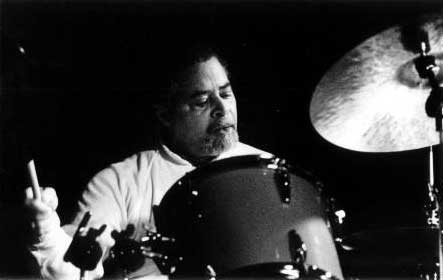
Jimmy Cobb, who unlike Philly Joe, is still alive. Cobb makes the top eleven list by virtue of his appearance on Kind of blue, the great ever jazz album, and by virtue of his longevity. He leads a group now called "Cobb's Mob." I love his cymbal beat. I'm amazed by how many of these drummers are still alive in their 70s and still playing great music.
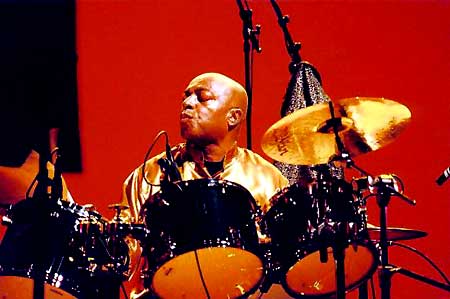
Roy Haynes is still going on strong, despite having started his career in the 1940s. I like his use of flat cymbal, which makes his intricate snare and hi-hit combinations more "transparent." Henry tells me there's an article by him in the Smithsonian that makes a case for his as the greatest jazz drummer. I'll have read the article and see what the argument is. I'd say his position as everyone's second favorite drummer is secure. That is, whomever you make number one (Buddy, Elvin, Tony, etc....), you could make the argument that Roy is just about as good. He was Coltrane's favorite sub when Elvin was out, for example. Or you could say he is the second best pure "bop" drummer after Max Roach.
***
Great article in the Jazz Times by Brad Mehldau on ideology and music taste.
7 dic 2003
Julia disappeared into her room and emerged 45 minutes later with another sestina. We'll be posting it soon on her blog (blogger was down most of the day). She wanted to surprise me. She wrote the order of the repeating words in the correct order (123456, 615243 etc...,) then wrote the corresponding word at the end of each line. Finally she wrote out the poem in her notebook, with a justified right margin.
5 dic 2003
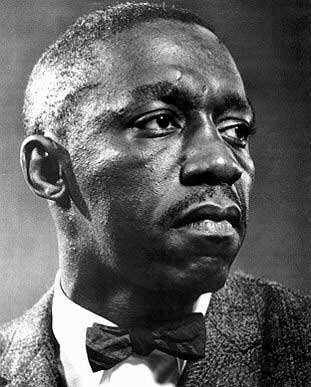
The order no longer matters that much as I round out my top 10 or 11. I'll probably keep going with my "honorable mentions" after I finish. This is Art Blakey, a uniquely powerful drummer. I get a headache after listening to the Blakey shuffle for an hour or so, but there's no denying his force and influence. He has a great Afro-Cuban polyrhythmic feel. Listen to him with the early group that had Lou Donaldson and Clifford Brown "Live at Birdland."
Blakey, along with Tony Williams, were influences on
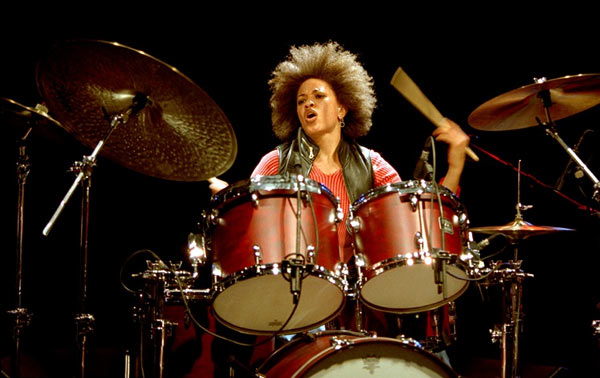
Cindy Blackman, a fantastically musical drummer on my honorable mention list. You might have seen her drumming on t.v. behind Lenny Kravitz, but she is actually a jazz drummer who leads her own group.
fait accompli: "Without introspection
no antenna for self-deception."
Yet introspection is not a reliable antenna against self-deception. I am very introspective yet may also be very self-deceived.
no antenna for self-deception."
Yet introspection is not a reliable antenna against self-deception. I am very introspective yet may also be very self-deceived.
4 dic 2003
Googlisms for "Jonathan Mayhew":
jonathan mayhew is a poet
jonathan mayhew is looking at poems from deal
jonathan mayhew is associate professor of spanish at the university of kansas
jonathan mayhew is that the controversial relationship between politics and religion is not new
jonathan mayhew is associate professor of spanish
jonathan mayhew is associate professor of spanish at the university of kansas
jonathan mayhew is associate professor of spanish at the university of kansas
***
The surprising thing is that I remember that quote about "looking at poems from deal." It is from Jordan Davis's blog about a year ago.
jonathan mayhew is a poet
jonathan mayhew is looking at poems from deal
jonathan mayhew is associate professor of spanish at the university of kansas
jonathan mayhew is that the controversial relationship between politics and religion is not new
jonathan mayhew is associate professor of spanish
jonathan mayhew is associate professor of spanish at the university of kansas
jonathan mayhew is associate professor of spanish at the university of kansas
***
The surprising thing is that I remember that quote about "looking at poems from deal." It is from Jordan Davis's blog about a year ago.
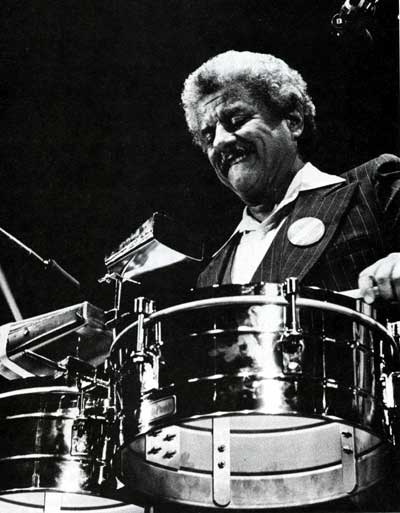
Is Tito a "jazz" drummer? He grew up in New York and actually played drum-set before timbales. He is steeped in jazz tradition, although he plays "straight eighths" rather than jazz swing patterns. The one time I saw him in public he was electrifying. I walked from my apartment in Palo Alto two blocks down to the Keystone Palo Alto and saw that Tito Puente was performing. I bought a ticket and walked in. Only Elvin was more impressive in person.
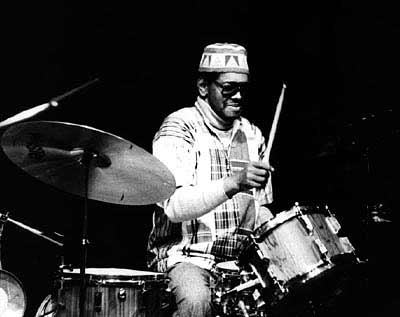
I'm altering my order a bit to highlight connections. Ed Blackwell is like the alter-ego to Billy Higgins. Both played with Ornette around the same time, and I can't get myself top prefer one or the other. Blackwell is perhaps more "avant" than Higgins. He is from New Orleans and you can here influences from him in Jeff Watts. Neither of them has that classic jazz "swing" feeling. Blackwell has more of an African polyrhythmic feel to his playing, and a higher pitched cymbal sound. I saw him with "Old and New Dreams" in the late 1970s, with Charlie Haden and Dewey Redman.
I don't know much of Blackwell's work post Ornette.
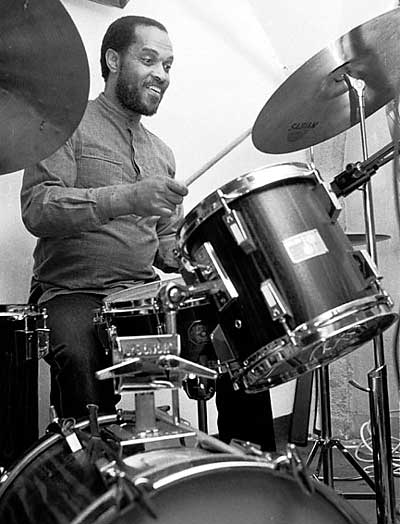
I first encountered Billy Higgins on the classic Ornette Coleman recordings of the 1959-60 period. Yet he is not, essentially, an avant-garde drummer. He is simply so versatile that he can fit into any setting. The consummate accompanist, it is estimated that he has appeared on over 800 separate albums.
He is clearly influenced by Max Roach, and belongs to that elegant but exuberant swinging tradition of Max and Papa Jo. I saw him perform a few years before his recent death. He played an amazing solo with brushes. He is known for maintaining a constant smile as he plays.
At the poetics seminar yesterday, Joe Harrington from the English department presented part of his fascinating multi-genre biography of his mother, who had worked for Senator Dole (Sr.) and died when Joe was 12. Part of the room might have wished him to be more directly sentimental, the other part of the room would have wished him to be more experimental or "unconventional," highlighting the collage aspects of the work even more. In any case, the project is sure to be a great hit when it is published.
3 dic 2003
Max Roach playing a tribute to
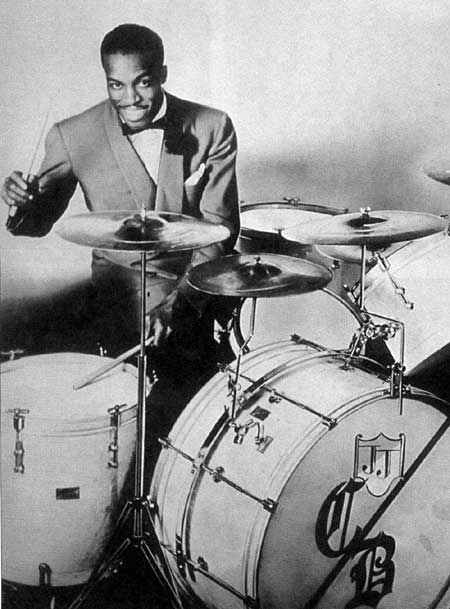
"Papa" Jo Jones. He acquired that nickname in part to distinguish himself from the "Philly" Joe Jones. Jones is the only pre-bop drummer on my top 11 list. He is the original drummer for Count Basie, and practically invented that classic hi-hat beat. What can I say? Listen to him playing with Lester Young and Teddy Wilson.

"Papa" Jo Jones. He acquired that nickname in part to distinguish himself from the "Philly" Joe Jones. Jones is the only pre-bop drummer on my top 11 list. He is the original drummer for Count Basie, and practically invented that classic hi-hat beat. What can I say? Listen to him playing with Lester Young and Teddy Wilson.
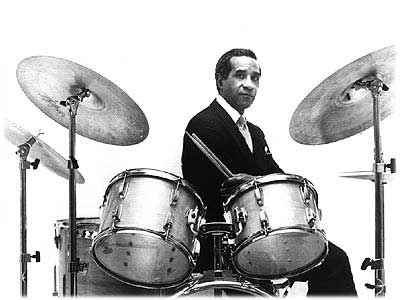
Max Roach. The classic bebop drummer. I recommend anything he did with Clifford Brown. He is also on Sonny Rollins "Saxophone Collosus."
There is a kind of "tasty" classicism to his drumming, which connects him to Papa Jo Jones (moving backwards) and to Billy Higgins (moving forwards). He pioneered the concept of "melodic" soloing. When I saw him perform he didn't have a band with him: he played unaccompanied drum set compositions.
His solos are miniature works of art, showing a wonderful sense of construction and form.
I don't have Kenny Clarke on my list. Not through any disrespect on my part, but because I don't have a concrete enough sense of him as a distinctive drummer.
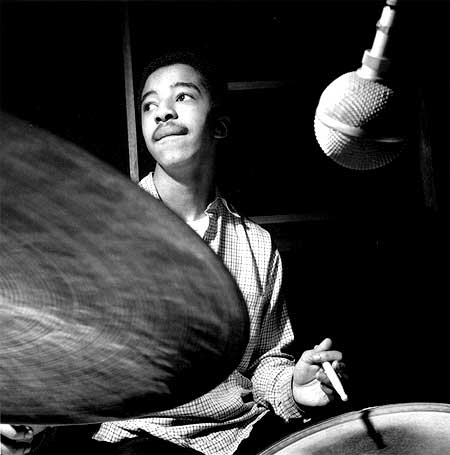
Tony Williams. He is as powerful as Elvin, perhaps even more subtle. Of more or less the same time-period, evolving in an equally modern direction, yet utterly different in style. You can compare his drumming to Elvin's, when both are working with virtually the same musicians: Wayne Shorter, Ron Carter, Herbie Hancock. Shorter's "Maiden Voyage" (Elvin), and Hancock's "Empyrean Isles" (Williams). "Miles Smiles" (Miles, with classic early-sixties group.
Williams' ride cymbal is incomparable. It sends shivers down my spine. He is extremely influential. Without him, there would be no Jack DeJohnette. He also pioneered jazz-rock fusion, but I'll forgive him for that.
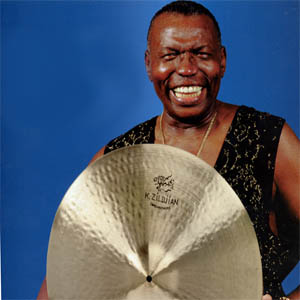
Number one has to be Elvin Jones, pictured here with a zildjian K Constantine cymbal. He invented a new jazz "feel," based on a distinctive ride cymbal beat and a "rolling triplet" pattern on the drums. A polyrhythmic feel based on the possibility of accenting any note of the jazz eighth-note triplet. He is uniquely powerful and subtle in his work with John Coltrane, but he is just as good today as forty years ago. He is electrifying in person.
He is not an especially "clean" or precise player. His beat is looser than drummers in the Buddy Rich (or the Max Roach) line. I actually prefer this looseness. The only other potential weakness is a certain tendency toward bombast, which he does share with Rich. Some people don't care for his cymbal sound, which I happen to love.
I'm going to do a run-down on my top jazz drummers. The fact that I don't include a particular drummer means only that he (or she!) does not belong to my purely personal pantheon. Yet at the same time my list is highy "canonical" and utterly unoriginal. This is my basic list, in approximate order. An asterisk means that I have seen the drummer perform in person.
1. Elvin*
2. Tony
3. Max*
4. Papa Jo
5. Billy*
6. Tito*
7. Ed*
8. Philly Joe
9. Roy
10. Art
11. Jimmy
1. Elvin*
2. Tony
3. Max*
4. Papa Jo
5. Billy*
6. Tito*
7. Ed*
8. Philly Joe
9. Roy
10. Art
11. Jimmy
2 dic 2003
1 dic 2003
Being too tired to come up with anything new today, I thought I'd try the "a year ago on JM's Blog" ploy:
Sunday, December 01, 2002
Having read Deborah Solomon's biography of Cornell, I dipped into her life of Jackson Pollock, at the public library. If it is less satisfying than the Cornell book maybe it is because Pollock doesn't seem to have much of an inner life. No mention of any books he read, any thoughts he had. He seemed to be all outward expression. He didn't know a foreign language!
posted by Jonathan Mayhew at 6:10 PM
Ron Padgett has a little essay about his confusion between the words - not the objects - "grapefruit" and "pineapple." What does this mean? Is it the same sort of confusion that I had when I used to mistake "On Green Dolphin Street" and "In a Mellotone"? No, because I actually confused the songs, not merely their titles.
posted by Jonathan Mayhew at 1:23 PM
Sunday, December 01, 2002
Having read Deborah Solomon's biography of Cornell, I dipped into her life of Jackson Pollock, at the public library. If it is less satisfying than the Cornell book maybe it is because Pollock doesn't seem to have much of an inner life. No mention of any books he read, any thoughts he had. He seemed to be all outward expression. He didn't know a foreign language!
posted by Jonathan Mayhew at 6:10 PM
Ron Padgett has a little essay about his confusion between the words - not the objects - "grapefruit" and "pineapple." What does this mean? Is it the same sort of confusion that I had when I used to mistake "On Green Dolphin Street" and "In a Mellotone"? No, because I actually confused the songs, not merely their titles.
posted by Jonathan Mayhew at 1:23 PM
Is it just paternal pride, or does Julia's poetry really rock? She was thrilled to be recognized by Language Hat over the thansgiving holiday.
Suscribirse a:
Entradas (Atom)
